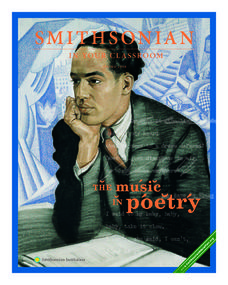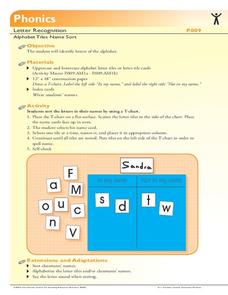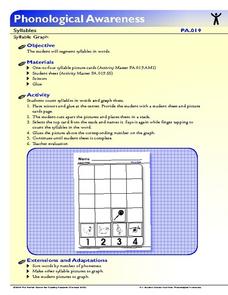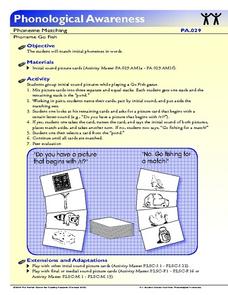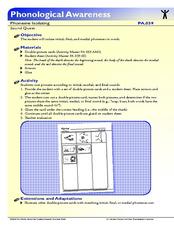NOAA
History's Thermometers
How is sea coral like a thermometer? Part three of a six-part series from NOAA describes how oceanographers can use coral growth to estimate water temperature over time. Life science pupils manipulate data to determine the age of corals...
Howard Hughes Medical Institute
Niche Partitioning Activity
Dinnertime on the African savanna is a highly choreographed event! Introduce young ecologists to the concept of niche partitioning through a hands-on activity. Pupils research animal behaviors and use data to develop an understanding of...
Florida Center for Reading Research
Comprehension: Text Analysis, Fiction and Nonfiction Find
Scholars analyze fiction and nonfiction text and fill in a worksheet detailing the text's title, genre, and reason for its classification.
Florida Center for Reading Research
Vocabulary: Word Meaning, Dictionary Cube
Scholars work together to define words and answer questions using a dictionary cube.
Florida Center for Reading Research
Phonological Awareness: Phoneme Matching, Final Phoneme Pie
Words are interesting things—you can change them by adding or subtracting phonemes. Here, emergent readers change the pictures on their phoneme pie by removing or adding various final phonemes. A fun way to build phonetic competency!
Smithsonian Institution
Smithsonian In Your Classroom: The Music in Poetry
Take poetry off the page and put it into terms of movement, physical space and, finally, music with this series of three lessons from the Smithsonian Institution. This resource introduces students to two poetic forms that originated as...
Curated OER
2001 AP® United States History Free-Response Questions
Rigorous and challenging, the AP Test for AP United States History contains a document-based question (with nine documents), as well as two additional free-response questions. Students who are preparing for the test will appreciate the...
Florida Center for Reading Research
Alphabet Borders
Help young scholars name the letters of the alphabet. They use the provided alphabet border and letter cards to take turns saying and finding various alphabet letters. This simple game can be extended by having learners focus on the...
Florida Center for Reading Research
Recognizing Letters
Boost letter recognition with an activity that challenges young scholars to match a plastic letter to one printed on a card.
Florida Center for Reading Research
Phonics: Letter Recognition, Alphabet Tiles Name Sort
Beginning readers practice identifying alphabet letters using upper and lower case letter tiles. Each class member is given a T-chart, letter tiles, and a name card. They then separate the letter tiles in their name from those not in...
Florida Center for Reading Research
Fluency: Letter Recognition, Speedy Alphabet Arc
On your mark, get set, match! Learners use a complete set of letters, matching each to its outlined letter on an arc. As they choose letters, they name them aloud. For added difficulty, another arc is missing most of its letters to...
Florida Center for Reading Research
Phonics: Letter Recognition, Hungry Letter Mouse
Scholars take turns writing and identifying letters on a whiteboard. Learner one writes a letter; learner two finds it on the alphabet strip. If they are correct, Mr. Mouse gets to eat that letter, and if they are incorrect, Mr. Mouse...
Florida Center for Reading Research
Letter Recognition: Tap Stack
Practice letter recognition using this fun alphabet game! Focusing on a suggested six target letters, this partner activity has learners saying and recognizing letter names as quickly as possible. Using a randomly chosen letter as the...
Florida Center for Reading Research
Phonological Awareness: Syllables, Clapping Names
Scholars practice identifying and counting syllables. Images of classmates are cut out and placed on a chart. Learners clap and count the syllables in each child's name. They finish by writing the number of syllables under the...
Florida Center for Reading Research
Phonological Awareness: Syllables, Syllable Graph
Scholars make a pictograph based on the number of syllables in each picture card. They choose a card, say the name of the object on the card, break the word into syllables, count the syllables, then glue the picture onto the number chart...
Florida Center for Reading Research
Phonological Awareness: Onset and Rime, Guessing Game
An activity challenges scholars to show what they know about onset and rime. Learners choose from a stack of picture cards and give onset and rhyming clues to see if their partners can guess the word they are holding.
Florida Center for Reading Research
Phonological Awareness: Phoneme Matching, Sound Maker - Sound Smacker
Scholars sort words based on their initial phonemes. They choose cards, say their names, and match the initial phoneme to the one posted on one of the sorting bins. If the initial sound matches, they put the card in the sound maker bin,...
Florida Center for Reading Research
Phonological Awareness: Phoneme Matching, Phoneme Go Fish
Go fishing for initial sounds with this engaging phoneme game! Similar to the card game Go Fish, pairs use picture cards and try to match initial sounds. They set aside any pictures that are a match and ask their partner for specific...
Florida Center for Reading Research
Phonological Awareness: Phoneme Isolating, Sound Quest
Scholars cut, paste, and identify specific initial, medial, and final phonemes by placing them on a phoneme chart.
Florida Center for Reading Research
Phonological Awareness: Phoneme Segmenting, Phoneme Hopscotch
Your class will love playing phoneme hopscotch! Scholars choose a card, say the name of the object on the card, break the word into phonemes, count the phonemes, then hop that many spaces on the hopscotch mat. Super fun!
Florida Center for Reading Research
Phonological Awareness: Phoneme Isolating, Phoneme Quest
In this phonics activity, little learners glue picture cards under the initial, medial, and final phonemes represented by the lead sound cards. An image of a shark broken into three parts represents the initial phoneme /sh/, the medial...
Curated OER
Phonological Awareness, Phoneme Manipulating, Phoneme Position Sort
Scholars make new words out of old ones by manipulating phonemes. Pupils mix and match initial, medial, and final phonemes to change words like cap into cup or head into bed.
Florida Center for Reading Research
Phonics: Onset and Rime, Say It Now
Pairs use onset and rime cards to make as many words as possible by blending the onsets with the rimes.
Florida Center for Reading Research
Phonics: Onset and Rime, Change-A-Word
Kids use their phonological know-how to identify and segment onset and rime blends. Double rime picture cards (cat and hat) are chosen, then matched to onset cards that make each word, such as the k sound for a cat and the h sound for a...
Other popular searches
- Education News
- Media Education Propaganda
- Media Education Esl
- Lesson on Media Education
- On Line Media Education
- Media Education Lesson Plans
- Media Education Tabloid
- Online Media Education
- Media Education Math
- Media Education Blogging
- Media Education Art Projects
- Media Education Blagging







